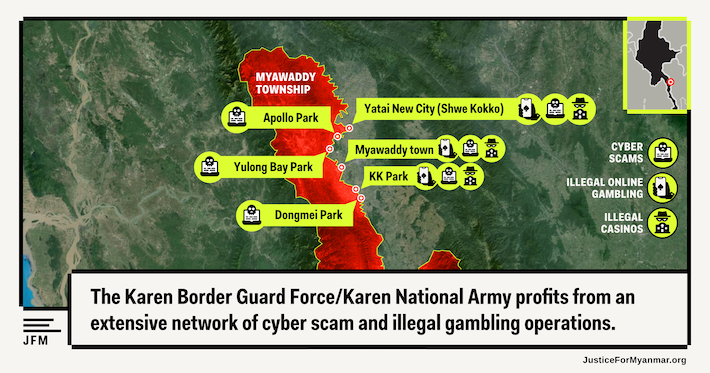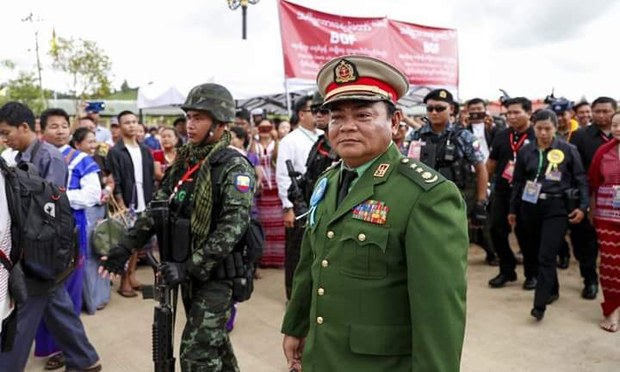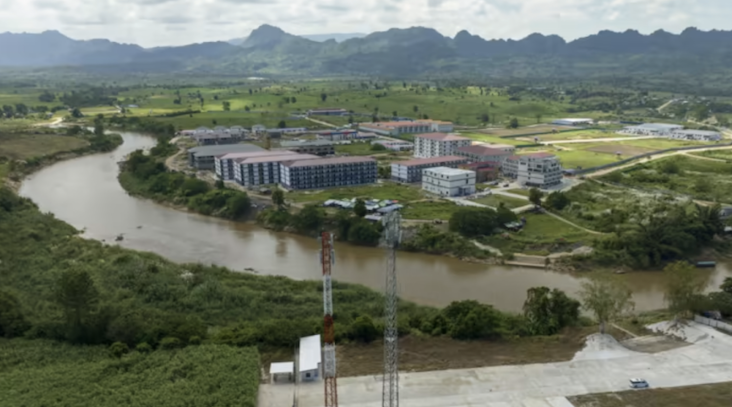Organized crime gangs running scamming compounds in Southeast Asia are attracting such huge amounts of illicit funds it is transforming their economies, a top US analyst has warned.
“Industrial-scale” compounds set up in parts of Myanmar, Cambodia and Laos have been reaping billions from victims in more than 100 countries, according to Jason Tower, country director for Burma (Myanmar) with the US Institute for Peace.
A “massive wealth transfer” is being undertaken by transnational crime groups who have set up sophisticated online scams to trick people out of their savings, he said, with hundreds of thousands of people working in compounds on the Myanmar border opposite the Thai town of Mae Sot that are heavily guarded by a notorious pro-military Border Guard Force.
ALSO SEE: FTX Fraudster Ellison Jailed, Ordered to Pay $11 Billion – BBC
Other smaller scamming hubs have been set up in border areas in Cambodia and a special economic zone in northern Laos where local governance is weak or co-opted by corrupt officials, Tower said.

“If you look at some of the numbers for Myanmar, Cambodia or the Mekong region more broadly, you’re seeing where the scam GDP [gross domestic product] – the amount that’s brought in by these online scams – has come to rival countries’ formal GDPs,” Tower said in a podcast on Southeast Asia’s scamming “crisis”.
“In Cambodia, you look at the numbers, [and] the scam economy represents roughly 40% of the country’s official GDP. So, this means it’s going to be very difficult to get consensus with ASEAN, or a strong crackdown on these issues.”
A report launched in July by a study group led by Tower and other experts such as Australian Professor Sean Turnell, said a conservative estimate of the funds stolen by scam syndicates last year was close to $64 billion.
The ‘Transnational Crime in Southeast Asia’ report estimates that criminal gangs are holding at least 220,000 people in scamming compounds in Myanmar and Cambodia, plus a further 85,000 in Laos.
The study group estimated that each worker earned a “conservative” $350 a day. Thus, it calculated that they brought in $12.5 billion to Cambodia last year – a sum “which is nearly half of the country’s formal GDP.”
And, using the same methodology, it said the funds stolen by criminal syndicates based in the three Mekong countries “likely exceeds $43.8 billion a year – over 40% of the combined formal GDP of Laos, Cambodia and Myanmar.”
The sum raised in Laos would be about $10.8 billion, about two thirds of its formal GDP, as noted by David Hutt, a writer for The Diplomat, who said most of the money is likely to be laundered internationally and funneled back to China. And Vientiane would surely like to tax some of the proceeds, as the World Bank says it has total national debt of 130% of GDP, most of it to China.
The conditions that workers are held in appears to vary wildly – from horrific to confinement in prison-like facilities with access to restaurants (and even prostitutes), but most are reportedly unable to leave until they complete a 12-month contract, or pay a large sum to leave.
Severe impacts on ASEAN & worldwide
In his podcast with the Strait Times, Tower said online scamming was now the “number-one form of crime in Singapore”, so police in the city-state were trying to devote more resources to counter the problem. And it was a similar problem in Malaysia, where each citizen had experienced an attempted scam 1.6 times a year, he said.
“If you look at the size of the scam economy and many of the countries, there’s a risk that they are evolving into scamming states.”
Tower said the criminal networks involved in scamming, some of them Chinese, are “extremely well networked around the globe.” And they have allegedly been trying to set up new hubs in Africa and the Middle East.
“Dubai has started to emerge, and there’s been a lot of reports about Sri Lanka, [plus] a lot of reports about Uganda,” he said.

Crime compounds ‘booming’
Sources in Mae Sot have confirmed that scam centres are “booming”, and that new compounds are being built near Payathonzu, opposite Three Pagodas on the Thai side, an isolated border region several hours south, halfway to Kanchanaburi.
“Gangs have moved from the Shwe Kokko criminal hub in Myawaddy,” according to a report by Irrawaddy, which said Chinese officials had put pressure on the triads and pro-military Border Guard Force led by Saw Chit Thu to get [some] foreign scamming gangs out of Myawaddy.
But multiple scamming compounds are reportedly still operating in areas north and south of Myawaddy (as seen in the map above).
Meanwhile, Tower said the UN Office of Drugs and Crime convinced officials in Laos to crack down on scam centres in the Golden Triangle Special Economic Zone in August, run by Zhao Wei, a notorious Chinese businessman sanctioned by the US in 2018.
Tower said criminals at the Lao SEZ appeared to get advanced information that a crackdown was coming, so the “kingpins” were likely gone by the time law enforcement officials entered compounds.
But he welcomed the Biden Administration’s move last month to sanction a Cambodian tycoon and ruling party senator allegedly linked to human trafficking, plus forced labour in cyber and virtual currency scams at a casino resort near the Thai-Cambodian border.
US sanctions were a good way of get banks to reassess if they want to do business with such individuals, Tower said. And now, he has called for sanctions to be imposed on Saw Chit Thu, the Karen “crime lord” who heads the Karen Border Guard Force in the Myawaddy region adjacent to Thailand.
“The evolving situation poses a direct threat to the national interests of Thailand, the US, Malaysia and dozens of other countries across Europe, Africa and South Asia now targeted by Myanmar-based criminals,” Tower said in a update late last week (Sept 26).
“In Myanmar, the crime networks undermine democracy and governance, threatening the security of thousands of Myanmar nationals who fled to the Karen borderlands to escape military conscription only to find themselves dragooned into forced criminality.

Notorious Karen warlord
“The central figure in the current changes is a powerful warlord in Karen State little known outside of Myanmar, Saw Chit Thu. Chit Thu was long the commander of the Karen Border Guard Force (BGF), a semi-autonomous paramilitary unit that operated under the auspices of the Myanmar army.
“Although these criminal operations are run largely by Chinese bosses, Chit Thu’s BGF has been key to their presence in Karen State since they arrived in late 2016. The BGF facilitated access to land and provided security for the burgeoning scam cities that rose along the Moei River separating Myanmar and Thailand.
“Chit Thu’s group has expanded a network of forced-labour crime hubs in partnership with China-origin mafia groups and other criminal militias.”
The group “smuggling fuel, electricity, telecommunications systems and other critical supplies from Thailand into Myanmar; and engaged in mass human trafficking, torture and gross human rights violations targeting victims lured from around the globe,” he alleged.
The scam crisis was so serious “states have to look much more closely at how social media is being used by criminal actors,” Tower said, because crime groups were able to link up to thousands of people via WhatsApp and Telegram every day.”
The other way to limit the scamming was greater regulation of crypto, Tower said, as that was how most victims’ savings were laundered.
- Jim Pollard
NOTE: Further details were added to this report on October 2, 2024.
ALSO SEE:
‘US to Sanction Prominent Cambodians Tied to Scam Centres’
N Korean Hackers Used Cambodian Firm to Launder Stolen Crypto
Scamming Compounds in SE Asia Stole $64 Billion in 2023: Report
High-Tech Asian Crime Wave: Cyber Scams, Casinos Loot Billions
Big Tech ‘Doing Little’ to Counter Rampant Scams on Social Media
Macau Junket King Alvin Chau Gets 18 Years For Casino Crimes
Crime Gangs Control Some Myanmar, Laos Economic Zones: UN
Justice for Myanmar report on Karen Border Guard Force






















